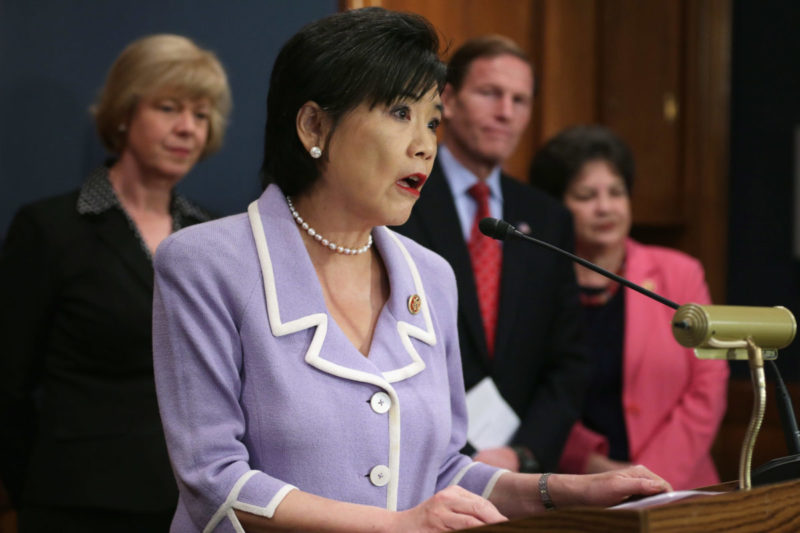With One Bold Act, Congress Can Protect Abortion Access
Sen. Richard Blumenthal, who helped reintroduce the Women's Health Protection Act, emphasized the urgency of passing the legislation.

During Tuesday’s press conference reintroducing the Women’s Health Protection Act, co-sponsor Rep. Lois Frankel shared an experience she said she will never forget.
“I found a friend nearly bleeding to death as a result of a botched abortion,” the Florida representative said. “She chose to put herself through that danger because she knew something that only she could possibly know—that she was not ready to become a mother.”
Frankel said she wished that her friend had a provider she could have trusted—and the grim reality is that things are starting to look eerily similar today. “Almost 40 years after Roe v. Wade, women are again being forced into these difficult decisions,” she said.
The Women’s Health Protection Act is a piece of federal legislation that would create a statutory right to abortion free from medically unnecessary restrictions. Sen. Tammy Baldwin co-sponsored the legislation alongside Sen. Richard Blumenthal and Reps. Judy Chu, Frankel, Ayanna Pressley, and Veronica Escobar.
As the battle over abortion access is raging in our court system, this legislation is critical. Anti-abortion lawmakers are feverishly passing restrictions in the hopes that they will be affirmed by a lower court stacked to the gills with Trump appointees and a Supreme Court with arguably the most conservative bench in recent history.
And given that this fall the Supreme Court will hear Dobbs v. Jackson Women’s Health Organization, which has the potential to gut Roe v. Wade, the reintroduction of the Women’s Health Protection Act comes not a minute too soon.
Blumenthal emphasized the urgency of this legislation, acknowledging the current state of abortion access as a “crisis,” and calling out the “false and deceptive measures” conservative lawmakers employ to decimate access. Some 500 state statutes like this have been passed over the last decade at an increasingly accelerated rate, he said. (Consider that roughly 1,300 abortion restrictions have been passed since Roe v. Wade was decided almost 50 years ago, according to the Guttmacher Institute. That means over a third of existing restrictions were passed in the last decade.)
Happening Now: Abortion access is under attack like never before. It’s time for Congress to protect this constitutional right & pass the Women’s Health Protection Act. #ActForAbortionAccess https://t.co/ggAqyGVv7C
— Richard Blumenthal (@SenBlumenthal) June 8, 2021
“I have never been as alarmed as I am today,” said Nancy Northup, president of the Center for Reproductive Rights, adding that abortion would become illegal in half the country if Roe is overturned or compromised.
The Women’s Health Protection Act has more than 200 co-sponsors, but it remains to be seen whether that will be enough to safeguard access. The legislation’s passage will likely prove difficult, especially with conservative Democrats like Sen. Joe Manchin in Congress. President Joe Biden has been lukewarm, at best, on abortion—he hasn’t even said the word since he took office—so it’s unclear whether the Women’s Health Protection Act will enjoy vocal support from the White House.
And even if it is passed, there will still be work to do. While the legislation is comprehensive, it does not address bans on insurance coverage, and is instead designed to work in conjunction with the EACH Act, which is currently working its way through Congress and does address this issue.
Still, the legislation’s potential impact cannot be underestimated, especially for those most adversely affected by abortion restrictions.
“We’re really appreciative that the Women’s Health Protection Act has gone further than it has before,” said Danielle Hurd-Wilson, field director at URGE. “Everything happening in the states comes down to white supremacy and anti-Black racism, and impedes on bodily autonomy [of] those that have historically been marginalized. It’s time to listen to people more affected by reproductive oppression.”
This sentiment was loudly echoed by the lawmakers on the call—that while white women of means will always have access to abortion, these restrictions fall hardest on low-income pregnant people, people of color, and members of the LGBTQ community.
Pressley connected the widespread use of abortion restrictions to other forms of systemic racism like police brutality. “It is simply no longer enough to say that you are pro-choice,” she said. “We have to actively say abortion care is health care and a fundamental right.”
This post was expanded from a Twitter thread.
